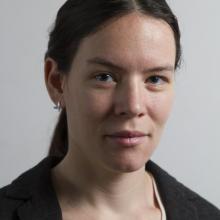Dans la même rubrique
-
Partager cette page
Quitterie de LABBEY
Assistante
 |
Localisation Adresse postale |
Bio
Quitterie de Labbey is a teaching assistant at the Department of Political Science of the Université Libre de Bruxelles (ULB) and a PhD student at REPI. Her research focuses on the critique and the contestation of arms exports in Belgium. Drawing on the literature on moral economies, pragmatic sociology and social movements, her research investigates the conditions of possibility of the critique of arms exports.
Prior to joining the ULB, Quitterie was affiliated to the Flemish Peace Institute (Brussels) where she investigated arms trafficking, diversion and gun violence as part of two research projects funded by the Internal Security Fund of the European Commission (Project TARGET and Project DIVERT).
Quitterie de Labbey was affiliated previously to the Stockholm International Research Institute (SIPRI), the Group of Research and Information on Peace and Security (GRIP), and the German Federal Ministry of Defence.
Quitterie graduated in 2018 from Sciences Po Lille and the Westfälische Wilhems-Universität Münster, where she holds M.A. degrees in ‘Intelligence, strategy and risk-management’ and ‘International and European governance’.
CV
- 2022 - ... : Université Libre de Bruxelles (ULB), PhD candidate, research assistant
- 2019 - 2021: Vlaams Vredesinstituut (VVI), Researcher for Project TARGET and Project DIVERT, focusing on arms diversion, trafficking and gun violence in the European Union
- 2018: Stockholm International Peace Research Institute (SIPRI), Researcher with the Dual-Use and Arms Trade Control department
- 2018: Group of Research for Information on Peace and Security (GRIP), Researcher on conflicts and stability in West Africa and arms export control
- 2016: German Federal Ministry of Defence, Analyst in the Department Strategy and Intervention, Unit Middle-East and North Africa
Présentation des enseignements
Quitterie de Labbey has been teaching seminars in the following courses:
Academic year 2025-2026:
- POLID 520 – Security practices and political violence
- POLID322 - Exercices de relations internationales (tbc)
- POLID 203 – Exercises in international relations
- Hist 202 – Histoire des relations internationales (correction of the exam)
Academic year 2024-2025:
- POLID104 – Approches méthodiques de questions politiques
- POLID 520 – Security practices and political violence
- POLID 203 – Exercises in international relations
- Hist 202 – Histoire des relations internationales (correction of the exam)
Academic year 2023-2024:
- POLID104 – Approches méthodiques de questions politiques
- POLID322 - Exercices de relations internationales
- POLID 438 - Méthodes d'enquête de terrain en relations internationales
- POLID 203 – Exercises in international relations
Academic year 2022-2023:
- POLID104 - Approches méthodiques de questions politiques
- POLID322 - Exercices de relations internationales
- POLID 438 - Méthodes d'enquête de terrain en relations internationales
- POLID543 - Final Dissertation Seminar
Travaux sélectionnés
- de Labbey, Q., Vanden Auweele, D., Duquet, N., (2022) Firearm Trafficking and Gun Violence in Belgium, Brussels: Flemish Peace Institute
- Vanden Auweele, D., De Labbey, Q., Duquet, N., (2022) Vuurwapengeweld in België – Op zoek naar een completer beeld, Brussels: Flemish Peace Institute.
- De Labbey, Q., Duquet, N., Cops, D, (2022) Trick and treat: Firearms fraud in the European Union, Brussels: Flemish Peace Institute.
- De Labbey, Q., Duquet, N. and Smets, L. (2021) Stealing precious steel: Firearms theft in the European Union, Brussels: Flemish Peace Institute.
- Bromley, M., de Labbey, Q. and Wezeman, P. (2019). “The financial value of state’s arms exports”, in: SIPRI Yearbook 2019. Armaments, Disarmament and International Security, Stockholm International Peace Research Institute, Oxford: Oxford University Press.
- De Labbey, Q. (2018). Diamants du sang: l’UE pourra-t-elle réformer le Processus de Kimberley?. Brussels: Group of Research for the Information on Peace and Security.
- De Labbey, Q. (2018) Monitoring de la stabilité régionale dans le bassin sahélien et en Afrique de l’Ouest – Avril à juin 2018. Brussels: Group of Research for the Information on Peace and Security.
- De Labbey, Q. (2018) Vers une montée en puissance de l’engagement allemand dans la sécurité en Afrique de l’Ouest ?. Brussels: Group of Research for the Information on Peace and Security.
- De Labbey, Q. (2018) Monitoring de la stabilité régionale dans le bassin sahélien et en Afrique de l’Ouest – janvier à mars 2018. Brussels: Group of Research for the Information on Peace and Security.
